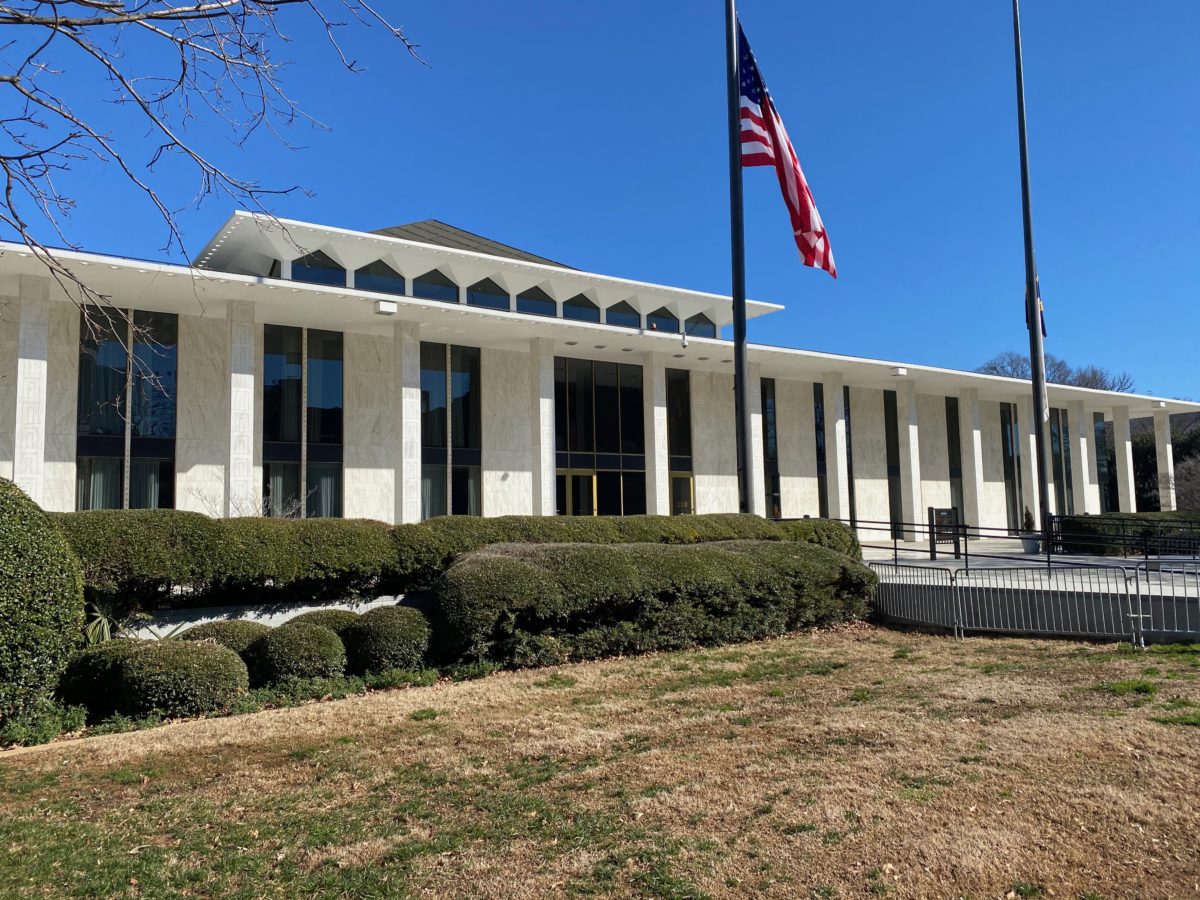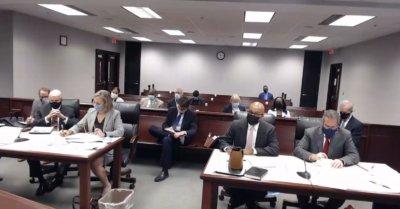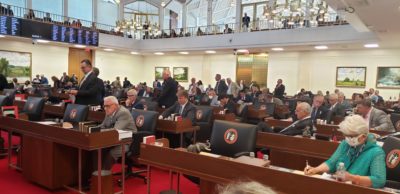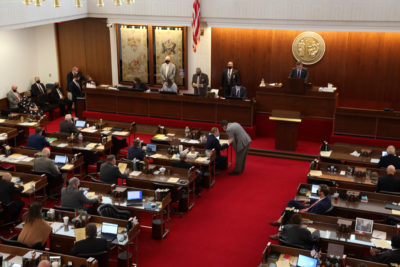
|
|
Update November 18, 2021: The budget bill passed the General Assembly and has been signed into law by Governor Roy Cooper. Read more here.
Legislative Republicans released a compromise budget Monday, which they said in a press release “reflects considerable concessions to Democrats,” and which they are “optimistic … will become law.”
Highlights of the two-year spending plan include an average 5% pay raise for teachers over the biennium, an increase of minimum wage for non-certified personnel and community college staff to $15 an hour, and $2,800 in bonuses to “most teachers” using federal dollars, according to a press release.
“We have made significant progress over nearly two months of good-faith negotiations with the Governor, and I’m optimistic that the budget will have a strong bipartisan vote and that Gov. Cooper will sign it into law,” Senate President Pro Tempore Phil Berger, R-Rockingham, said in a press release Monday.
Here is the money report.
Here is the budget bill.
The compromise is much awaited for many reasons. For one, the end of the fiscal year was June 30, making the budget more than four months late. Second, the state hasn’t had a new budget since 2018. The General Assembly passed a two-year spending plan in 2019 but Democratic Gov. Roy Cooper vetoed it, in part because it didn’t include Medicaid expansion and he didn’t think the teacher pay raises were high enough.
The result of all this is that teachers haven’t had a pay raise in years. The raises proposed in the compromise budget are different than the wide variety offered by lawmakers and Cooper this year, but ultimately amount to more of a middle ground between Democrat and Republican plans.
The Senate proposed an average increase to teachers of 3% over two years, while the House was looking at an average 5.5%. Cooper was pushing for a 10% average raise.
The compromise budget pay increase for teachers breaks down to a 1.3% pay raise in both years of the biennium across the board. Add in step increases for eligible teachers, and the salary increase is an average 5% raise over two years.
Cooper and lawmakers have been in negotiations over the budget since the House passed its spending proposal back in August, and many observers thought a compromise was ultimately possible. But Cooper and legislative Republicans were never able to reach a full agreement.
A tweet from Cooper last week said Republican leaders told him that the ultimate budget would have a number of his priorities, including increased education spending, but that Medicaid expansion wasn’t going to happen.
Pat Ryan, spokesperson for Berger, said that the negotiations did result in an additional $125 million for education, $100 million of which is going to be used for teacher supplements for most districts. Many districts offer supplemental salaries to what the state provides for teachers, but districts without a large property tax base often can offer very little or nothing, meaning that richer districts are able to siphon off talent.
This state-funded salary supplement would offer districts money to make them competitive, Ryan said.
“Lower-wealth counties that have already really tapped out their tax base … they’ll get a pretty large amount,” he said, adding later: “The philosophy is that these smaller counties just can’t compete for top-tier talent with the Wakes (Wake County) and the Mecks (Mecklenburg County) of the world.”
Here is a list of all districts in the state and how much money they will get for teacher supplements. A few districts — Wake, Durham, Buncombe, Mecklenburg, and Guilford — will get no money under the plan.
“The idea here is they already have the capacity to be competitive with the teacher supplements,” Ryan said.
Adding in these supplemental funds, the average increase for teachers over the biennium goes up to 6.7%, which was touted in a press release from House Speaker Tim Moore, R-Cleveland.
“This budget represents months of hard work and good-faith negotiations between Republicans and Democrats, House and Senate, and our Governor,” he said in the press release. “Although we have many differences, we each had the common goal of coming together to create a spending plan for the state, one of the General Assembly’s most important constitutional obligations. In the end, I am confident that we have come together to design a budget that truly meets the most critical needs of all North Carolinians.”
In total, the net appropriation for the public instruction portion of the budget is more than $10.6 billion in the first year of the biennium and almost $11 billion in the second year.
Other K-12 or early childhood items of note
- Gives recurring funding for $1,000 annual supplement for school counselors
- Budget funds “to raise all levels of the principal salary schedule by 2.5%” in each year of the biennium
- Holds harmless districts so that they don’t lose funding if their student population drops under projected numbers
- Funds an additional 115 school psychologist positions. There are 115 traditional school districts in the state
- Raises funding cap for children with disabilities allotment from 12.75% to 13%
- Increases the reimbursement rate child care centers receive to serve children in NC Pre-K by 4% over the biennium
- Allocates $20 million in federal funds for grants for child care centers and NC Pre-K classrooms for start-up costs, quality improvements, and capital needs. The priority is for facilities in high-poverty districts and child care deserts
- Gives Smart Start $10 million in additional funding in each year of the biennium
- Provides almost $2 million recurring in the second year of the biennium to bolster the classroom supply allotment
- Provides more than $70 million in additional funds in the first year, and more than $78 million in additional funds in the second year for the needs-based public school capital fund
- Creates a new “allocation” where each county will get $300,000 in the first year and $500,000 in the second year for repairs and renovations of education buildings
- Loosens financial-need restrictions on who can apply to the opportunity scholarship program, which gives state money to students to attend private schools
- Eliminates the controversial Innovative School District
- Includes additional funds for children with disabilities and academically gifted children
The North Carolina Association of Educators (NCAE) weighed in Monday night on the budget. President Tamika Kelly said the organization was still reviewing the document but that some things were clear.
“…the state has the funds to pay for what the public overwhelmingly supports—meaningful raises, student services, adequately resourced classrooms and more to provide opportunity for all students to reach their potential. However, state lawmakers chose new tax cuts over our children’s education,” she wrote in a statement.
Community colleges
The net appropriation for the community college system is more than $1.3 billion in both years of the biennium.
The budget has across-the-board salary increases of 2.5% in the first year and another 2.5% in the second year for community college personnel. The budget also gives a little more than $8.6 million in the first year and more than $12 million in the second year to create a fund that can be used to get and retain faculty in high-needs areas.
The budget also includes almost $80 million in non-recurring funds to stabilize the budgets of community colleges that have seen a loss of enrollment thanks to COVID-19.
Other highlights of the community college budget include:
- Funds for nine IT experts to help community colleges prevent and deal with cybersecurity attacks
- Funding for a pilot program aimed at expanding career options for students with intellectual and developmental disabilities
- Additional funding for needs-based assistance program
- $15 million in non-recurring funds to increase broadband access at 25 rural community colleges
- Funds to help community colleges start programs for high-demand career fields
- Money to help increase attempts to “raise awareness” about career and technical education programs
- Funding for adult learners at community colleges
- Money for child care grants, which helps community college students with child care
Consequences of no compromise?
While teachers are looking forward to a raise for the first time in years, they have already missed out due to the inability of Cooper and legislative Republicans to work together.
Because lawmakers and Cooper couldn’t rectify their differences in 2019, no budget passed and thus no teacher pay raises or bonuses went into effect. As a result, teachers collectively lost out on $58.3 million over the 2019-2021 biennium.
In addition, the failure of the governor and lawmakers to compromise could have some impact on how the state’s creditors view it.
State Budget Director Charles Perusse said in an email that the bond rating agency Moody’s Investors Service said that the difficulties surrounding passage of state budgets both during the last biennium budget process and the current one “reflects some governance weakness.”
That statement is supported by a November 2019 analysis from Moody’s which said at the time that the lack of a budget was a bad sign.
“…the lack of agreement on budget priorities amid a time of economic expansion and healthy revenue growth does not augur well for budgeting and strong governance during times of economic and revenue stagnation or declines,” the analysis stated.
Perusse said that bond rating agency Fitch Ratings said “the ongoing budget impasse signals a more systemic breakdown in fiscal decision-making processes.”
As for the third big bond rating agency, Standard & Poor’s Global Ratings, Perusse said that they mentioned the budget situation but didn’t have anything specific to say. The comments from the three agencies mentioned by Perusse happened over the summer, he said.
Perusse said that while the budget impasse was a “credit negative,” the state does have safeguards in place — especially its practice of having a continuation budget that can keep government funded even without the passage of a new budget. That allows the state to continue to repay its debt service. He also cited the ability of the state to “draw on reserves and other funds to meet obligations” as positive counterbalances.
What about Leandro?
Perhaps the most noticeable item in the budget is what’s not in it: anything directly addressing the comprehensive Leandro plan that has been ordered implemented by Judge David Lee.
Just last week, Lee ordered the state to turn over about $1.7 billion to fund the next two years of a plan aimed at ensuring students their constitutional right of access to a sound basic education. It’s unclear what is going to happen next in the case, but under the compromise budget, the state has almost $2.5 billion in unused funds in the first year of the biennium. Read more of our coverage of Leandro here and here.
The statement on the budget from Kelly, the NCAE President, also said: “The budget includes more than $2 billion in new tax cuts. That’s a choice to prioritize tax cuts over complying with the court-mandated constitutional requirement to fund public education,” she said, referencing Leandro. “Our advocacy work is not yet finished.”
The budget will be taken up today in the Senate.





